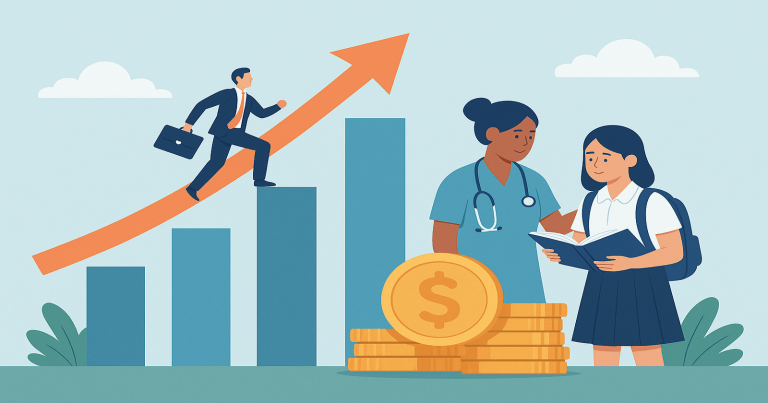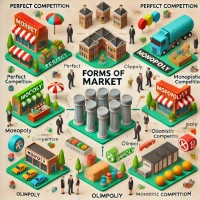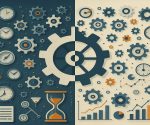An important concept to grasp while discussing economics is the distinction between economic growth and economic development. Although they appear similar, both carry a bearing on countries, corporations, and individuals, but they have very different meanings. Economic growth is usually seen as an increase in the time frame of a country’s output of goods and services, with GDP as the usual measure. From this perspective, growth gives rise to minor improvements in production, income, etc. Economic development, however, is a more general conception that includes improvements in living standards, health, education, and income distribution. It looks at the well-being of people and the quality of life in a country, not just the increase in cash.
The chief difference between these two lies in the scope and measurement. Economic growth is more concerned with things that numbers can measure; economic development involves things to do with improving people’s lives and the opportunities before them. Thus, as countries grow economically, they wish to make the whole process meaningful in the sense of growth and development and see that the whole society shares the benefits.
What is Economic Growth?
Economic growth is the increase in the production of goods and services over time within a country. It is typically measured by the increase in the country’s Gross Domestic Product (GDP) or Gross National Product (GNP). Economic growth happens when there is more investment in production, technology, and resources, leading to an increase in national income.
Economic growth is important because it shows how much a country is producing and whether it is moving forward economically. If a nation grows economically, the level of living typically rises. Individuals are likely to earn more, which can mean improved employment and improved access to services.
Key Characteristics of Economic Growth
- Rise In National Output: Economic remembering follows with the production of more goods and services. It is usually measured through changes in the GDP, which is indicative of the value of all goods and services produced within a nation.
- Better Income Levels: Increased income levels result in the growth of an economy, as the working individual can sell more goods and services.
- More Jobs: As companies expand their activities, more jobs are created. Economic growth might create more jobs and, therefore, lessen the unemployment rate.
- Better Infrastructure: With good growth comes better infrastructure like roads, transport, and communications. This, in turn, makes it easy for businesses to operate and for people to access services.
Indicators of Economic Growth
- Gross Domestic Product (GDP): The total market value of all finished goods and services produced within a country during a specific period.
- Per Capita Income: An indicator that divides national income by the population, showing average earnings.
Examples of Economic Growth
- India’s Growth: India has seen rapid economic growth in the past few decades. It has experienced a significant increase in its GDP due to industrialization and a booming tech sector.
- China’s Economic Growth: China’s transformation from an agrarian economy to an industrial powerhouse has resulted in significant economic growth, lifting millions out of poverty.
What is Economic Development?
Economic development is a broader concept that looks at the overall well-being of the people in a country. It includes improvements in health, education, and income distribution. While economic growth focuses on increasing national output, economic development focuses on improving the quality of life for individuals.
Development in the economic sphere links up with social and political changes upon which such an economy is built. It focuses on eradicating poverty, improving healthcare and education, and ensuring quality provision to all citizens, irrespective of their status or income level.
Key Characteristics of Economic Development
Economic development is concerned with social and political change in an economy. It deals with the alleviation of poverty, improving health care, and providing a good education to every individual, be he rich or poor, irrespective of his income or social status.
- Early Improvement in Living Standards: Economic development means higher living standards. For example, improved housing, better health, education, or basic services. Living standards improve if the income is sufficiently and evenly shared.
- Health and Education: Economic development is about improving the standards of health services, nutrition, and sanitation, as education leads to better skills and better jobs for people.
- Income Equality: Whereas economic growth could increase inequalities, economic development seeks to reduce the disparity in the income of the rich and poor. In other words, it is concerned with ensuring the benefits of growth are passed on to all strata of society.
- Sustainability: Economic development, etc., for another set of concerns, also includes the sustainability aspect of things, which guarantees no harm to the environment through the economic processes and makes sure that natural resources are utilized satisfactorily.
Indicators of Economic Development
- Human Development Index (HDI): A composite index that includes life expectancy, education, and per capita income.
- Poverty Rate: The percent of the population living below the poverty line.
- Literacy Rate: A measure of the percentage of persons who can read and write, thus reflecting educational progress.
- Access to Healthcare: The extent to which medical services of proper standards are available to the people.
Examples of Economic Development
- Norway: Norway is an example of a country where economic development has significantly improved citizens’ quality of life. It has universal healthcare, education, and a high standard of living.
- South Korea: South Korea’s rapid industrialization has resulted in significant improvements in education and health, leading to a much higher standard of living for its people.
Key Differences Between Economic Growth and Economic Development
Grasping the difference between economic growth and economic development is very important in economics and makes the trajectory of economic and social development in a country clearer. Although both are related in some sense, they emphasize different aspects of progress in a nation. Next, we will talk a bit more about the differences between these terms, focusing on definition, measurement, and real-world consequences.
| Aspect | Economic Growth | Economic Development |
| Definition | The increase in the production of goods and services over time. | The improvement in the well-being of people through better living standards, education, and healthcare |
| Focus | National output and wealth | The quality of life of individuals and social welfare. |
| Measurement | Measured by GDP (Gross Domestic Product) or GNP (Gross National Product). | Measured by the Human Development Index (HDI), poverty rates, literacy rates, and health indicators. |
| Objective | To increase the wealth and output of a nation. | To improve living standards and reduce poverty and inequality. |
| Impact on Society | Primarily benefits businesses and investors, may not benefit everyone equally. | Ensures that the benefits of growth are distributed equally across society. |
| Scope | Narrower scope focused on economic output and productivity. | Broader scope, focusing on long-term improvements in health, education, and social equality. |
| Time Frame | Short-term, focuses on output and national income. | Long-term, focusing on sustainable, inclusive growth. |
| Income Distribution | Often leads to increased wealth but may result in inequality. | Aims to ensure more equitable distribution of wealth and opportunities. |
| Sustainability | Can lead to environmental degradation if growth is not controlled. | Emphasizes sustainability, using resources efficiently to protect the environment. |
| Policy Focus | Focus on capital investment, entrepreneurship, and increasing production. | Focus on improving education, healthcare, income equality, and social infrastructure. |
Factors Affecting Economic Growth
The velocity and sustainability of economic growth are governed by a multitude of factors that may spur or undermine this progress. Here are some of the main factors affecting economic growth:
- Capital Formation: Investment in physical capital, such as machinery or infrastructure, can increase productivity, hence leading to growth.
- Technological Change: Improvements in technology lead to better production methods, thereby increasing economic output.
- Labor Supply: An educative, skilled and healthy labor supply can directly increase productivity, thus contributing to economic growth.
- Natural Resources: The availability of natural resources (minerals, oil, arable lands, etc.) may provide inputs for production.
- Government Policies: Economic policies that encourage investment, entrepreneurship, and trade would lead to growth.
- Global Economic Environment: A conducive global environment, with steady activities regarding international trade and capital flows, can certainly fasten the pace of growth.
Factors Affecting Economic Development
Many social, political, and economic elements influence the process of economic development with the aim of promoting human welfare and improving standards of living. Here are the major factors that influence economic development:
- Education: One of the prime requisites of economic development is access to quality education from primary through higher levels so that meaningful skills are developed, literacy rates improved, and productivity enhanced.
- Healthcare: An effective healthcare system is essential for a healthy population, which is a labor force. Furthermore, a well-established healthcare system contributes to life expectancy, quality of life, and poverty reduction.
- Income Distribution: A fair distribution of wealth ensures that every segment of society derives benefits from economic development and that sustained poverty and social inequalities are bridged.
- Political Stability: Stable governance and legal frameworks establish conducive favorable conditions, whereas corruption-free institutions are encouraged for the growth of an economy.
- Infrastructure Development: Investments in infrastructure, especially in transportation and communications, boost productivity and accessibility.
- Environmental Sustainability: Sustainable development practices ensure that economic advancement does not pay for environmental dilapidation.
Difference between economic growth and economic development FAQs:
What is the main difference between economic growth and economic development?
Economic growth refers to the increase in a country’s output of goods and services. In contrast, economic development focuses on improving the quality of life for citizens through better health, education, and income equality.
Can a country have economic growth without development?
Yes, it is possible. A country can experience economic growth but still have inequality, poverty, and other social issues if it doesn’t focus on improving the well-being of its people.
How do we measure economic growth?
Economic growth is usually measured by the increase in a country’s GDP or GNP, which represents the total value of goods and services produced.
How do we measure economic development?
Economic development is measured by indicators like the Human Development Index (HDI), which includes income, education, and life expectancy.
Why is economic development more important than economic growth?
Economic development is more important because it focuses on the well-being of individuals. Without development, growth may not lead to improved living standards or equality.


